
Santander Earnings Beat Estimates as Rates Boost Spain, Europe
Banco Santander SA’s earnings beat estimates as higher interest rates in Europe boosted revenue, offsetting the impact of
2023-07-26 13:29
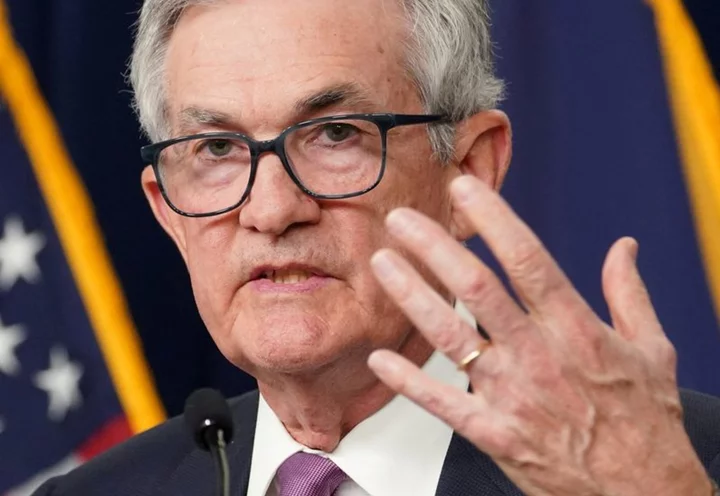
Marketmind: Markets brace for Fed decision, earnings flood
A look at the day ahead in European and global markets from Brigid Riley All eyes are on the Federal
2023-07-26 12:59
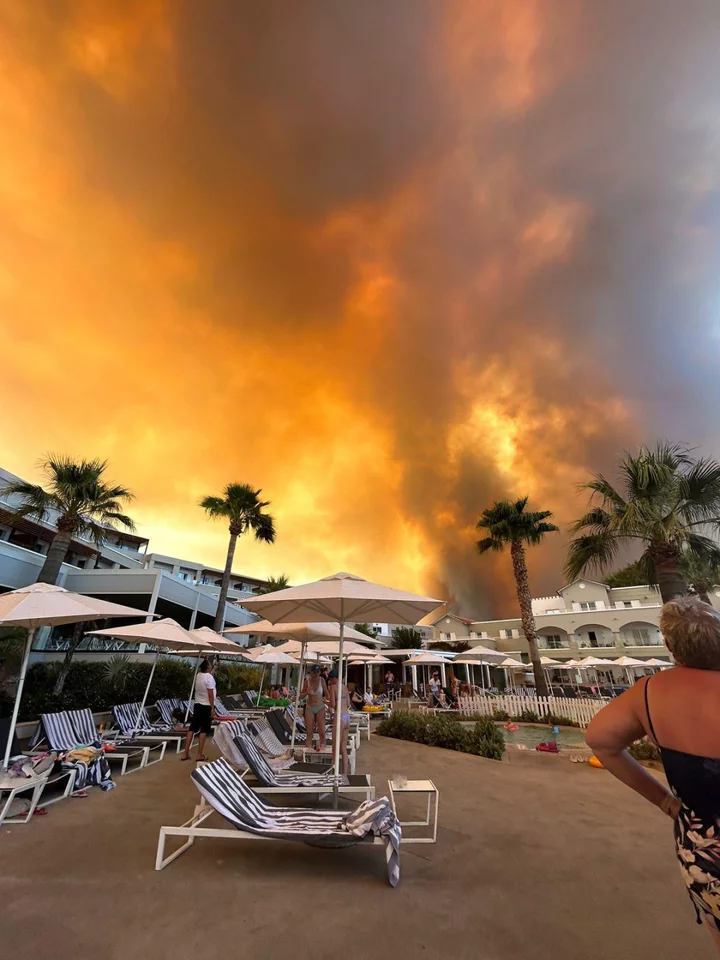
Greece fires – live: Tourists in Rhodes and Corfu evacuated as Croatia also battles wildfires
Croatia is battling wildfires as thousands of tourists have fled Rhodes and Corfu amid blazes ravaging Greece. A firefighting plane is dropping water on a mountainside in Župa DubrovaÄka in Croatia after a wildfire broke out last night. Almost 100 firefighters are on the scene and several vehicles, according to reports. It comes as 20,000 people had to leave homes and hotels in Rhodes over the weekend as the inferno that began a week ago spread, while over 2,000 holidaymakers returned home by plane on Monday. After the blaze in Rhodes prompted “the biggest evacuation” in Greek history, civil protection authorities warned of “extreme risk” of wildfires on the island of Crete, while around 2,500 people have already been evacuated from Corfu, which has been enduring dozens of blazes. Prime Minister Kyriakos Mitsotakis told parliament on Monday the country was “at war” and said on Tuesday the next days would be difficult, with conditions possibly improving after Thursday. Read More Are Greece wildfires caused by climate change? Wildfires: Is it safe to travel to Greece right now? Britons tell of ‘terrifying’ and ‘traumatic’ experiences amid Rhodes wildfires Firefighters killed in Greece plane crash as yet more record temperatures are forecast
2023-07-26 11:46

Oil Edges Lower After Four-Day Climb With Fed Decision in Focus
Oil edged lower after a four-day rally of almost 6% as traders took stock of the advance and
2023-07-26 09:58

L’Occitane Owner Said to Mull Buyout of $4.2 Billion Firm
L’Occitane International SA’s controlling shareholder is considering a move to take the skin-care company private, people with knowledge
2023-07-26 09:45

Six men guilty of murder over Brussels terror attacks that killed 32 people
Six men have been found guilty of murder over the 2016 Brussels terror attacks that killed 32 people and injured hundreds in what is Belgium’s worst peacetime violence. The morning rush hour attacks on March 22, 2016, at Zavantem Airport and on the Brussels subway’s central commuter line deeply shook the city, home to the headquarters of the European Union and Nato, and put the country on edge. Among those convicted was Salah Abdeslam, who already is serving a life sentence without parole in France over his role in attacks that hit Paris cafes, the Bataclan theatre and France’s national stadium in 2015. Both the Brussels and Paris attacks were claimed by the Islamic State (IS) group. The verdict was reported by public broadcaster RTBF, newspaper Le Soir and news websites HLN and Nieuwsblad. The chief judge read out the verdict and explanations by the 12-person jury, who made a clear connection to IS and its extremist ideology. The reading of the verdict was expected to take several hours. In addition to the six people convicted of terrorist murder, four others on trial were acquitted or facing other charges. Terrorist murder was among various charges suspects were facing. Sentencing will be decided in a separate process, not before September. The biggest trial in Belgium’s judicial history unfolded over seven months in a special court to address the exceptional case. In addition to the 32 people killed in the attacks, nearly 900 others were wounded or suffered serious mental trauma. Jamila Adda, president of the Life4Bruxelles victims’ association, gathered a group of survivors at the special courthouse to hear Tuesday’s verdict. Among them was a man named Frederic, who said the ‘”atrocious crimes” of March 22 still haunt him. “We have been waiting for this for seven years, seven years that weighed heavily on the victims ... We are waiting with impatience, and with some anguish” for the verdict, he told The Associated Press. Frederic, among the commuters who survived the attack at the Maelbeek metro station, spoke on condition that his last name not be published to protect his identity. Survivors have supported each other through the proceedings, some coming every day. “It is important to be together, to hear the decision of justice,” Frederic said. And then, they hope “to be able to turn the page”. The 12 jurors have been deliberating since early July over some 300 questions the court asked them to consider before reaching a verdict. Those convicted could face up to 30 years in prison. Abdeslam was the only survivor among the Islamic State extremists who struck Paris in November 2015 and were part of a Franco-Belgian network that went on to target Brussels four months later. After months on the run following the Paris attacks, Abdeslam was captured in Brussels on March 18, 2016, and his arrest may have prompted other members of the Islamic State group cell to rush ahead with attack plans on the Belgian capital. Also on trial in Brussels was Mohamed Abrini, childhood friend of Abdeslam and a Brussels native who walked away from Zaventem airport after his explosives failed to detonate. Oussama Atar, who has been identified as a possible organiser of the deadly attacks on both Paris and Brussels, was tried in absentia. He is believed to have died in the Islamic State group’s final months of fighting in Iraq and Syria. Read More Jury to deliver verdict over Brussels terrorist attacks that killed 32 Trial of 10 accused over 2016 Brussels attacks that killed 32 takes major step toward conclusion ‘We are waiting for answers’: Belgium’s largest terror trial begins in Brussels Jury to deliver verdict over Brussels terrorist attacks that killed 32 Are Greece wildfires caused by climate change? Firefighters killed in Greece plane crash as more record temperatures are forecast
2023-07-26 05:28
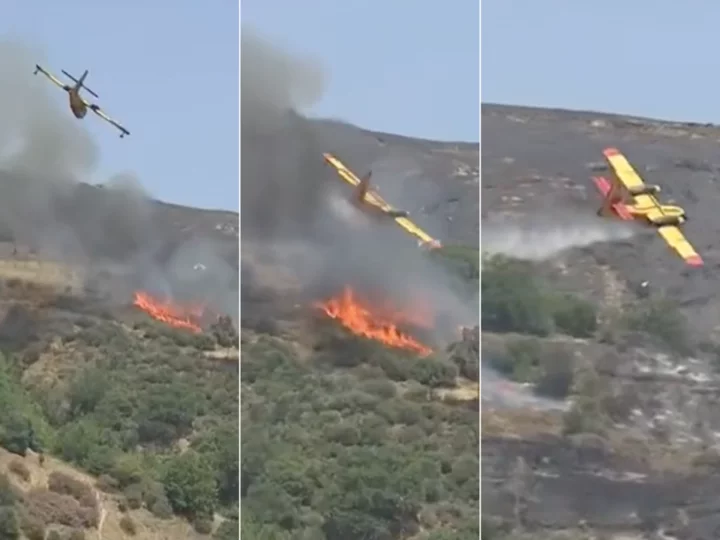
Firefighters killed in Greece plane crash as yet more record temperatures are forecast
Two pilots fighting wildfires in Greece joined the death toll from the extreme weather blistering Europe on Tuesday, as temperatures are forecast to peak on Wednesday and the wildfire risk is set to remain high until at least the end of the week. Commander Christos Moulas, 34, and copilot Pericles Stefanidis, 27, died when their plane, which had been dropping water, crashed near the town of Karystos on the island of Evia near Athens, where one of a number of fires has been burning. A senior meteorologist at the Met Office, Amy Bokota, told The Independent that the latest heatwave gripping the Mediterranean is set to further intensify on Wednesday, when the extremely warm weather is expected to peak, with a high risk of wildfires continuing until at least Friday. Parts of Greece, Italy, Turkey and the Balkans will experience temperatures in the low to mid-40s Celsius on Wednesday, she said, with records likely to be broken in places. Wildfires rely on high temperatures and windy conditions, so although the temperatures are forecast to drop to a little above average on Thursday and Friday, the wind is due to increase and consequently the elevated risk of wildfires will continue, especially as “everything is so dry”, said Ms Bokota. A third successive heatwave in Greece pushed temperatures back above 40C in parts of the country on Tuesday. Tens of thousands of people have been evacuated from homes and resorts amid fires that have raged for days, exacerbated by strong winds. The holiday island of Rhodes has been hit particularly hard by the blazes, and the battle to contain the flames continued for a seventh day on Tuesday. The Greek government said authorities there were carrying out the largest evacuation ever undertaken in the country. Yet many British tourists are continuing to fly to Rhodes undeterred. Despite just 44 of the 85 scheduled passengers opting to travel on a morning flight from London Gatwick on Tuesday, the mood was mostly upbeat and the high number of empty seats went largely unnoticed, with one passenger remarking happily on the rarity of having enough space on a plane. “I’m sure you know it is hot,” the pilot announced as he began the descent, adding: “We all wish you luck in Rhodes, whatever the reasons are for you taking this flight out there today.” The crew returned to Gatwick with a packed flight of 186 passengers. “I want to get off the island as soon as possible,” one woman on holiday with her three young children told The Independent at the check-in queue at Rhodes international airport. Describing the terrifying moments prior to their party of seven’s escape from Lardos on Saturday afternoon, Jodie Sutton, a 31-year-old from Southport, said: “We were watching the fire coming over the mountain. It didn’t get too close, we were out of there. “[The evacuation was] chaotic, we were rammed on a coach with hundreds of people. It was hot and sweaty, and I’ve got three young kids with me.” “We got taken to a school in Archangelos, then that was in danger, so we had to move from there too, to Rhodos,” said the full-time mother, whose children are aged one, two and seven. “We had to sleep on the floor in a basketball court. The kids got blankets. The [volunteers] were amazing.” But she added: “Tui told us nothing. Jet2 told us nothing. We ended up phoning the fire brigade, the police and the British government and Greek government last night, and they said, ‘Stay where you are, you are safe.’” Another couple who visited nearby Lindos on Saturday, before the road to the village was shut because high winds were fanning the flames in unpredictable directions, recalled the smoke from the fires blocking out the sun like an eclipse. John Rennie, 49, a project manager from Southport, who was catching a flight to Manchester with his wife Marie-Claire, said they were ultimately only affected by power outages and water shortages. It was a minimal impact compared to that suffered by their host at Kremasti, whose family saw fire burn through two of their homes. “He was helping as a volunteer. There seems to be a big community circle on the island helping each other,” Mr Rennie told The Independent. Greek prime minister Kyriakos Mitsotakis has warned of difficult days ahead: “All of us are standing guard. In the face of what the entire planet is facing – especially the Mediterranean, which is a climate-change hot-spot – there is no magical defence mechanism. If there was, we would have implemented it.” Elsewhere, fire forced the temporary closure of Palermo airport in Sicily. Regional authorities said a woman died after an ambulance could not reach her home because of the blaze. Further north, the weather broke and an intense overnight storm tore off roofs and brought down trees in cities including Milan. Two women were killed in the northern provinces of Monza and Brescia. Algeria was fighting to contain devastating forest fires along its Mediterranean coast, where blazes have killed at least 34 people, including 10 soldiers encircled by flames during an evacuation, the country’s defence ministry said. Some 8,000 firefighters and 530 trucks, backed by military firefighting aircraft, fought the blazes in scorching heat. Wildfires spread to France on Tuesday afternoon, with several dozen firefighters using aircraft to battle a blaze in Cagnes-sur-Mer and Villeneuve-Loubet close to Nice international airport. While temperatures have been topping 40C in Europe, it has been even hotter in north Africa, with temperatures of 49C recorded in some cities in Tunisia. Extreme weather throughout July has caused havoc across the rest of the planet, mirroring the chaos wreaked throughout southern Europe, with record temperatures in China and the United States sparking forest fires, water shortages, and a rise in heat-related hospital admissions. Without human-induced climate change, the events this month would have been “extremely rare”, according to a study by World Weather Attribution, a global team of scientists that examines the role played by climate change in extreme weather. Read More Arsonists behind Corfu’s devastating wildfires as Greece ‘at war’ Tourists flying into Greece inferno reveal why they refuse to cancel holiday Greece wildfire: Video shows Rhodes hotel before and after blaze Playing with fire: We are not just breaking heat records, we are smashing them
2023-07-26 03:58
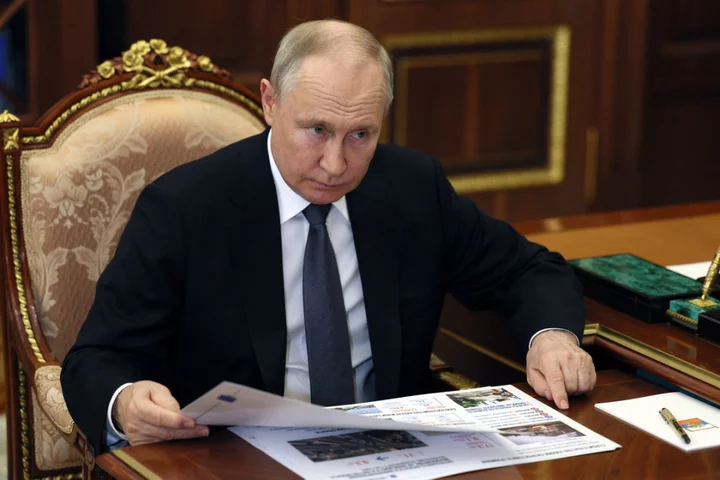
Putin ‘looked paralyzed and unable to act’ as Wagner coup unfolded
Vladimir Putin was reportedly left “paralysed” when the Wagner coup began and no orders were given that day. The mercenary group launched its short-lived mutiny on 24 June, driving its forces towards the Kremlin and preaching open rebellion against Russia’s military leadership – only to abandon its mission just hours later. Now, security officials from Ukraine and other parts of Europe have spoken out, claiming the Russian president was unable to act when he first heard the news. According to intelligence assessments shared with the Washington Post, Mr Putin got a warning from Russian security services that the leader of the Wagner Group Yevgeniy Prigozhin was possibly planning a rebellion, two or three days before it began. But while security was increased at some strategic facilities, such as the Kremlin, including increasing the presidential guard and handing out more weapons, no other action was taken in response to the threat. One European security official, who wished to remain anonymous, told the Washington Post: “Putin had time to take the decision to liquidate [the rebellion] and arrest the organisers. “Then when it began to happen, there was paralysis on all levels … There was absolute dismay and confusion. For a long time, they did not know how to react.” This account of the standoff, which is being viewed as one of the most severe threats to Mr Putin’s presidency in 23 years of his rule, has reportedly been corroborated by officials in Western governments. It’s also consistent with the public comments from William J. Burns, the CIA director, who said that for the majority of the 36 hours when the coup was happening, the military, security services and decision-makers “appeared to be adrift”. According to the analysis, Mr Putin’s indecision shows his fear of countering a warlord like Mr Prigozhin. The Wagner Group leader had played an essential role in the Kremlin’s global ambitions, having previously run troll farms which disseminated disinformation in the US and paramilitary operations in the Middle East and Africa. He then took up the Wagner leader position in the war against Ukraine. But Kremlin spokesperson, Dmitry Peskov, denied the “paralysis” claims, telling the Washington Post, they were made by “people who have zero information”. European security officials added that Mr Putin’s lack of direction meant local officials were then left to decide what to do. Acting without any clear orders, local military decided not to try to stop the Wagner troops, which were heavily armed, as they advanced towards Moscow. Such lack of action led some people to believe the Wagner troops were acting with at least some agreement from the Kremlin. This was despite Mr Putin’s televised address on 24 June saying he promised there would be tough action against the rebels. The way the events unfolded also shows serious cracks and a worsening divide in Russia’s military and security over how the Ukraine war is being handled. Many individuals in the upper sections of the military and security services have reportedly shown support for Mr Prigozhin’s efforts to overturn Russia’s military leadership. Critics of Russia’s president say his lack of direction during the rebellion has left him a lot weaker. Former colonel in the Russian security services and now an opposition politician in exile, Gennady Gudkov, told the Washington Post: “Putin showed himself to be a person who is not able to make serious, important and quick decisions in critical situations. He just hid.” A month after the coup, thousands of Wagner group mercenaries have arrived in Belarus, prompting Nato member Poland to reinforce its eastern border against the “potential threat” they pose. Between 3,450 and 3,650 soldiers have travelled to a camp close to Asipovichy, a town 230 kilometres (140 miles) north of the Ukrainian border, according to Belaruski Hajun, an activist group that tracks troop movements within the country. Read More Why are Wagner mercenaries in Belarus – and would they try to invade Poland? Russia-Ukraine war – live: Putin launches fresh drone strikes on Kyiv as air raid sirens wail across capital Putin signs off law banning Russians from changing gender in latest blow to LGBT+ community The Body in the Woods | An Independent TV Original Documentary The harrowing discovery at centre of The Independent’s new documentary
2023-07-26 03:26

Rhodes fires: Family into military dinghies during beach rescue
Paul Watson, from Cockermouth, was just days into a holiday in Rhodes when his hotel was evacuated.
2023-07-26 01:18

European Stocks on Longest Winning Streak Since Jan; Miners Jump
European shares rose for a sixth straight day, the longest streak since January, as miners rallied on China
2023-07-25 23:56

Eni’s Renewables Arm Plenitude On Track to Meet Profit Target, Unit CEO Says
Eni SpA’s Plenitude renewables arm is on track to meet its profit target for 2023, as it prepares
2023-07-25 23:51
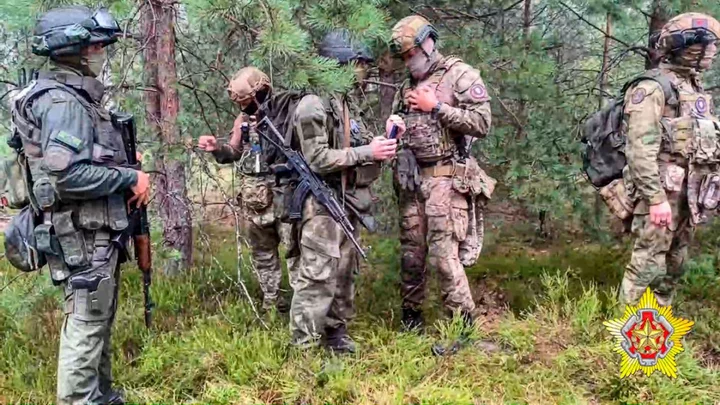
Why are Wagner mercenaries in Belarus – and would they try to invade Poland?
Thousands of Wagner mercenaries have arrived in Belarus since the group’s failed mutiny against Moscow led by its founder Yevgeny Prigozhin – leading to Nato member Poland reinforcing its eastern border against the “potential threat” they pose. Belarusian president Alexander Lukashenko welcomed Wagner forces into the country after brokering a deal between the Kremlin and Mr Prigozhin, which stopped the mercenaries’ march on Moscow about 125 miles from the capital. He and Russian president Vladimir Putin have spoken about the mercenaries on a number of occasions, including during two days of talks over the weekend and into Monday, the Kremlin said on Tuesday. The Wagner chief called the mutiny a “march of justice” to oust the top military leaders. The mercenaries faced little resistance and downed at least six military helicopters and a command-post aircraft, killing a number of Russian troops. The revolt posed the most serious threat to President Putin during his 23-year rule, eroding his authority and exposing the cracks in the military, and changing the direction of the Kremlin’s 16-month invasion of Ukraine. Here’s a look at where we are now: How many Wagner fighters are in Belarus, and where are they? Between 3,450 and 3,650 soldiers have travelled to a camp close to Asipovichy, a town about 140 miles (230km) north of the Ukrainian border, according to Belaruski Hajun, an activist group that tracks troop movements within the country. Satellite images show that about 700 vehicles, along with construction equipment, have also arrived in Wagner convoys to Belarus, Belaruski Hajun said. Mr Prigozhin also registered a “real estate management company” in Belarus last week under the name Concord Management and Consulting in Belarus. Documents analysed by independent Belarusian media outlets showed that the company’s registered address was in the same village as the Wagner mercenary camp. Why is Poland so concerned? The bigger issue for Poland is that the Belarusian Defence Ministry has made clear over the last week or so that the mercenaries are providing training for Belarusian soldiers, including at training grounds close to the Polish border. “Wagner fighters who have really been in the heat of combat are passing on valuable information and experience to our servicemen,” the Belarusian Defense Ministry said in a statement. One of the ranges is in Brest, about three miles (5km) from Poland’s eastern border. Warsaw said it was ready for “various scenarios as the situation develops”, having started moving around 1,000 of its own troops towards the border earlier this month. According to claims made in a post by a senior Wagner commander, known by his nom de guerre “Marx”, which was republished by Wagner’s Telegram channel, up to 10,000 fighters “have gone, or will go” to Belarus – although the accuracy of that statement is difficult to verify. Poland’s Defence Ministry said the country’s borders were secure. In response to Warsaw reinforcing its border, the Kremlin tried to paint it as an “aggressive” move – despite Moscow’s invasion of Ukraine being the ultimate genesis of it. The Belarusian interior minister, Ivan Kubrakov, met Wagner commanders at a training centre to draw up a “clear plan of action”, a statement said. “In view of the difficult situation near the republic’s borders, it is especially important to be ready to respond to potential challenges and threats,” Mr Kubrakov said. He was quoted as hailing the mercenaries’ “practical experience” following their months-long experience of combat in eastern Ukraine, notably in bloody battles such as those that have taken place around the eastern city of Bakhmut. Would Wagner troops try to invade Poland? It would be foolish. With Poland being a Nato member, crossing the border could bring Article 5 of the alliance’s treaty into play. It states that an attack on one member state is considered an attack on all members. Given Mr Putin’s talk about military action against Belarus being on a par with attacking Russia, Wagner forces heading into Poland is the last thing either Mr Putin or Nato needs. However, that has not stopped the Belarusian leader, Mr Lukashenko, from stirring the pot. In a meeting with the Russian president on Sunday, Mr Lukashenko said that Wagner troops were “stressing [him] out” by calling for “an excursion” into Poland. He said that his government in Minsk was “controlling” the situation by keeping the group in the centre of the country. “They are asking to go west ... to go on a trip to Warsaw ...” Mr Lukashenko told Mr Putin. “But of course, I am keeping them in central Belarus, like we agreed.” It suits both Mr Putin and Mr Lukashenko to have Europe worry about its borders. It allows both men to keep talking tough on the international stage – and play to voters at home. The remarks have largely been dismissed by experts, with the American Institute for the Study of War – which monitors the fighting in Ukraine – saying that Wagner troops there could not threaten Ukraine and Poland. “There is no indication that Wagner fighters in Belarus have the heavy weaponry necessary to mount a serious offensive against Ukraine or Poland without significant rearmament,” the think tank said in a statement. The deputy head of Ukraine’s Main Intelligence Directorate, Vadym Skibitsky, also said that there was no “direct threat” from Russian mercenaries in Belarus, but that Kyiv would be keeping a close eye on the Wagner fighters. “Our assessment is very simple: today there is no direct threat [from Belarus], but we are ready. We are monitoring everything related to the so-called Wagner missile defence system,” he told journalists, according to the directorate’s Telegram channel. Read More The Body in the Woods | An Independent TV Original Documentary The harrowing discovery at centre of The Independent’s new documentary Extremist attacks wounded Paris. Here's why the city turned to the 2024 Olympics to heal Mali's army and suspected Russia-linked mercenaries committed 'new atrocities,' rights group says Monitoring group says thousands of Wagner mercenaries have arrived in Belarus since failed uprising
2023-07-25 22:19
